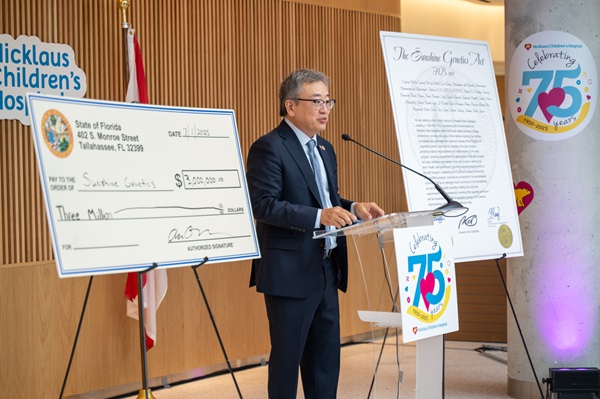Published on: 07/10/2025
State leaders and Miami’s top medical and research institutions unite to propel Florida to the forefront of genomic medicine and rare disease innovation.
Florida is fast emerging as a national leader in pediatric rare disease research as Gov. Ron DeSantis signs HB 907, launching the Sunshine Genetics Pilot Program with a $3 million investment. The Sunshine Genetics Act lays the foundation for a $100 billion genomic medicine industry in Florida, and it’s the strength of partnerships that will turn that vision into reality.
On Thursday, leaders from Nicklaus Children’s Hospital, Florida International University, and the University of Miami joined state officials and stakeholders for a ceremonial bill presentation recognizing the historic investment and the collaborative spirit driving this effort. Together, these institutions will help end the diagnostic odyssey for families confronting one of the more than 7,000 rare diseases affecting 30 million Americans.
“Solving rare diseases requires more than funding, it demands a unified commitment from Florida’s brightest minds and most trusted healthcare institutions,” said Rep. Adam Anderson, whose son Andrew passed away from Tay-Sachs disease. “With the support of Nicklaus Children’s, FIU, and UM, we’re proving the power of partnership and setting a national example for how lives can be saved through collaboration, innovation, and early detection.”
The Sunshine Genetics Act, championed by Anderson, establishes a five-year genetic newborn screening pilot program and the Sunshine Genetics Consortium, uniting Florida’s leading researchers, clinicians, and biotech innovators. Effective July 1, 2025, the law positions Florida at the forefront of genetic medicine, transforming pediatric care and accelerating discoveries that will benefit families across the country.

Leaders from the Miami institutions praised the effort and emphasized the importance of working together to advance genomic medicine and improve patient outcomes.
“FIU is proud to serve as a member of the Sunshine Genetics Consortium and is excited to join Representative Anderson in his efforts to address pediatric rare diseases,” said FIU President Jeanette Nuñez. “FIU is training tomorrow’s doctors and developing tomorrow’s cures. In fact, earlier this year, the FIU Herbert Wertheim College of Medicine and Nicklaus Children’s Hospital launched an academic partnership to expand pediatric training opportunities for students, enhance patient care, and strengthen clinical and educational research. We look forward to working with the consortium to improve care for our youngest patients and continue to give hope to our youngest patients and their families.”

“Nicklaus Children’s has been at the forefront of genetic testing for years with programs like Baby Manatee which help children with rare diseases receive answers to their diagnostic odyssey as quickly as possible,” said Matthew A. Love, President and CEO of Nicklaus Children’s Health System. “This is why we are proud to participate in the Sunshine Genetics Consortium. Together with other healthcare providers and state leaders, we have a powerful opportunity to change the trajectory for children living with rare diseases. Thanks to healthcare champions like Representative Anderson, Florida is leading the way, and we are honored to be part of that journey.”
“The Sunshine Genetics Act marks a pivotal moment for Florida’s children and families. At
Sylvester and the Miami Miller School of Medicine, we are proud to lead with research rooted in academics and a health system that harnesses the power of genetics to diagnose earlier, treat
more effectively and ultimately save lives,” said Stephen D. Nimer, M.D., director of Sylvester
Comprehensive Cancer Center and executive dean for research at the University of Miami Miller
School of Medicine. “This investment advances our mission, where research is conducted to
deliver precision medicine to every child, regardless of the rarity of their condition.”
“This is the kind of bold, forward-looking investment that makes Florida a national model,” Anderson added. “And it’s only possible because our partners see the bigger picture and are ready to lead.”
The Miami event follows a ceremonial presentation held Wednesday at Florida State University, which will receive $4.5 million to expand the Florida Institute for Pediatric Rare Diseases. Together, these landmark investments are creating a statewide ecosystem for rare disease research and personalized medicine, ensuring that no family walks their journey alone.
With this effort, Florida isn’t just advancing science, it’s building a legacy of compassion, innovation, and opportunity for generations to come.